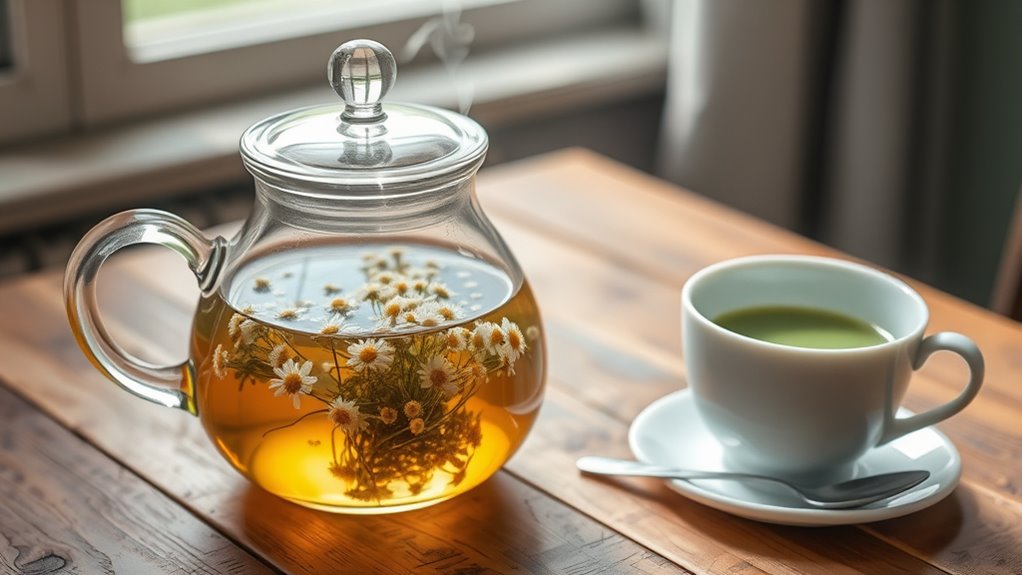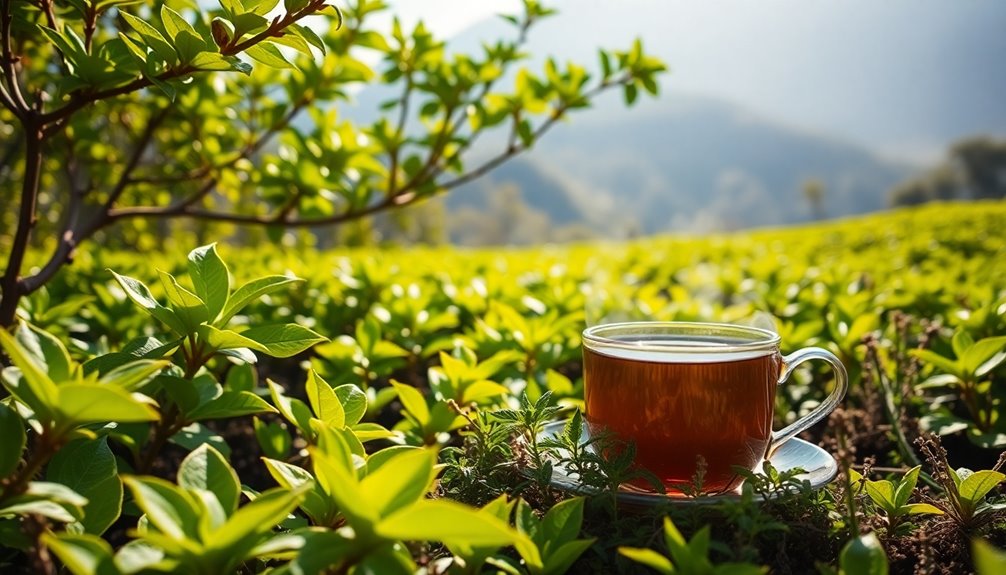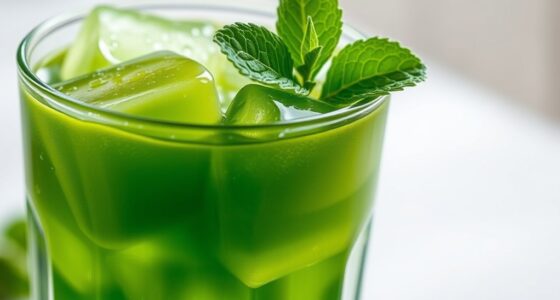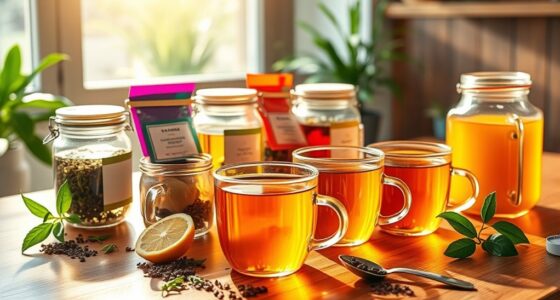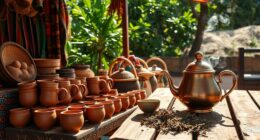During intermittent fasting, you can enjoy black, green, white, or herbal teas to stay hydrated and boost antioxidants without breaking your fast. Drink these teas in the morning or mid-morning to curb hunger and support your energy levels. Be mindful of caffeine and avoid added sugars or creamers. Incorporating the right teas at the right times can enhance your fasting benefits—more helpful tips await if you keep exploring.
Key Takeaways
- Opt for calorie-free teas like black, green, white, or herbal to stay hydrated without breaking your fast.
- Drink tea in the morning to kickstart hydration and antioxidant intake, and mid-morning or mid-afternoon to curb hunger.
- Prefer herbal teas such as chamomile or peppermint for relaxation and digestion support during fasting periods.
- Limit caffeine to moderate levels to prevent dehydration, jitters, or sleep disturbances.
- Avoid adding sugar, milk, or artificial flavors to maintain the health benefits and keep the fast intact.
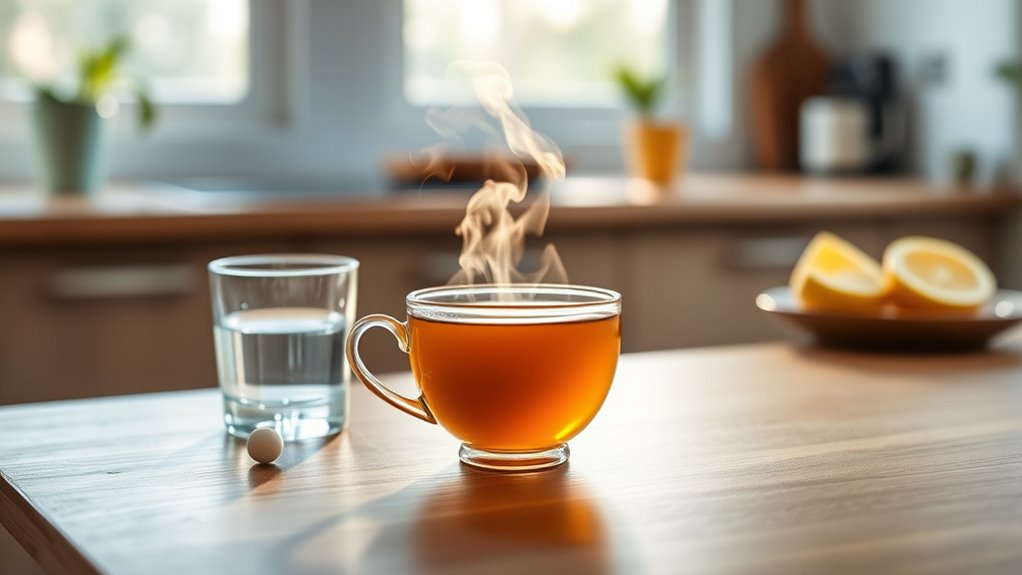
Intermittent fasting has become a popular approach to improve health and manage weight, and drinking tea can complement this routine effectively. When you fast, staying properly hydrated is essential, and tea can be an excellent choice to support fasting hydration without breaking your fast. Tea contains tea antioxidants, natural compounds that combat oxidative stress and support your immune system, making it a smart beverage choice during fasting periods. These antioxidants also help reduce inflammation and may enhance your overall health, so sipping a cup of tea can give your body a boost while you’re in a fasted state.
One of the key benefits of incorporating tea into your fasting routine is that it’s virtually calorie-free, especially when you avoid adding sugar or milk. This means you can enjoy the soothing warmth and flavor of tea without disrupting your fast. Black, green, white, and herbal teas all provide hydration and a rich supply of antioxidants, making them ideal for maintaining energy levels and mental clarity throughout your fasting window. Drinking tea during fasting also helps curb hunger pangs, as the warmth and flavor can satisfy cravings and keep you feeling full longer.
Timing your tea consumption is vital. Many people find it beneficial to have a cup of tea in the morning to start their day with hydration and antioxidants, or during mid-morning and mid-afternoon when hunger or cravings tend to strike. Just be mindful not to overdo it, as excessive caffeine intake can lead to dehydration or jitters. Herbal teas, like chamomile or peppermint, are great options for calming your digestive system and relaxing your mind, especially during longer fasts. These teas also support fasting hydration, ensuring you stay well-hydrated without consuming calories. Additionally, tea antioxidants play a crucial role in supporting your immune system and overall health during fasting periods.
Remember that tea can be a versatile addition to your fasting routine. It’s not only hydrating but also a way to incorporate beneficial antioxidants into your day. As you become more accustomed to fasting, you’ll appreciate how tea helps you stay energized and focused without breaking your fast. However, avoid teas with added sugars, artificial flavors, or creamers, as these can introduce calories and negate some benefits. Ultimately, choosing the right teas at the right times is a simple yet powerful way to enhance your fasting experience and support your health goals.
Frequently Asked Questions
Can I Add Milk or Sweeteners to My Tea During Fasting?
You might wonder if you can add milk additives or sweetener options to your tea during fasting. Typically, adding milk or sugar can break your fast because they contain calories that trigger insulin responses. If you prefer sweeteners, opt for zero-calorie options like stevia or erythritol. But keep in mind, even small amounts of milk additives can interrupt your fast, so it’s best to stick with plain tea or herbal infusions.
Does Herbal Tea Affect Ketosis or Fasting Benefits?
Herbal tea generally doesn’t impact ketosis or fasting benefits when you drink it plain. Its benefits include hydration, antioxidants, and soothing effects, which support your fasting goals. Just make sure to avoid adding sweeteners or milk, as they can break your fast and interfere with ketosis. Drinking herbal tea can enhance your fasting experience by helping curb hunger and providing health benefits without compromising your progress.
Is Decaffeinated Tea Equally Effective During Intermittent Fasting?
Is decaffeinated tea equally effective during fasting? Think of it as a ghostly whisper—subtle yet significant. Decaffeinated tea offers zero calorie beverages with little to no caffeine content, making it a suitable choice. It helps keep you hydrated without breaking your fast or disrupting ketosis. While it may lack the energizing punch of caffeinated versions, it still provides hydration and some antioxidants, making it an effective option for fasting periods.
How Does Tea Consumption Impact Hunger Levels During Fasting Periods?
Tea can markedly impact your hunger levels during fasting. It contains compounds like catechins and antioxidants that help with hunger suppression and appetite regulation. Drinking tea, especially green or herbal varieties, can make fasting more manageable by reducing feelings of hunger. Plus, it keeps you hydrated without breaking your fast. So, incorporating tea into your fasting routine may help you stay on track and curb cravings effectively.
Are There Specific Types of Tea That Enhance Fasting Results?
Certain teas can boost your fasting results. Look for herbal infusions like chamomile or peppermint, which contain tea antioxidants that support digestion and reduce cravings. Green or black teas also offer antioxidants that may enhance fat burning. Avoid adding sugar or milk, as they break your fast. Choosing these teas helps you stay energized, curb hunger, and maximize the benefits of your fasting routine.
Conclusion
Incorporating tea into your intermittent fasting routine is like adding a gentle breeze to a warm day—refreshing and comforting. Just remember to choose your drinks wisely and time them right to maximize benefits without breaking your fast. Whether it’s green, black, or herbal, tea can be your ally in staying hydrated and curb cravings. Stay mindful of what you sip, and let tea be a soothing companion on your fasting journey.

